从谚语翻译的角度探讨中西文化的差异(1)
- 格式:pdf
- 大小:142.82 KB
- 文档页数:3
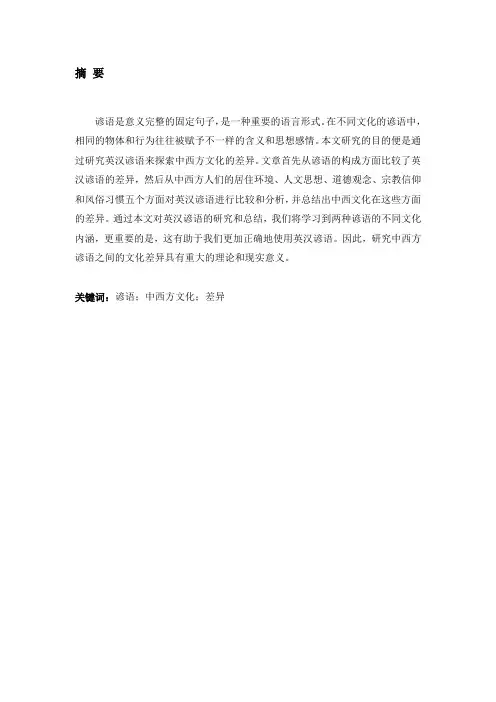
摘要谚语是意义完整的固定句子,是一种重要的语言形式。
在不同文化的谚语中,相同的物体和行为往往被赋予不一样的含义和思想感情。
本文研究的目的便是通过研究英汉谚语来探索中西方文化的差异。
文章首先从谚语的构成方面比较了英汉谚语的差异,然后从中西方人们的居住环境、人文思想、道德观念、宗教信仰和风俗习惯五个方面对英汉谚语进行比较和分析,并总结出中西文化在这些方面的差异。
通过本文对英汉谚语的研究和总结,我们将学习到两种谚语的不同文化内涵,更重要的是,这有助于我们更加正确地使用英汉谚语。
因此,研究中西方谚语之间的文化差异具有重大的理论和现实意义。
关键词:谚语;中西方文化;差异AbstractProverb is a complete sentence,and it is an important form of language. In the different proverbs that from different culture, the same things and the same behavior show represent different means and different feelings. The paper is aimed to explore the cultural differences between Chinese and Western proverbs. Firstly, the author analysis the differences from their unique characteristics, then summarizes the differences of living environment, humanistic idea, moral views, religious beliefs and social customs between Chinese culture and Western one by comparing and analyzing Chinese proverbs and English ones. Through the study and summary of this paper we will learn the different cultural connotation from different culture. What’s more, we will use Chinese and Western proverbs more easily and more accurately. So it is no exaggeration to say that a comparison between English and Chinese proverbs is of great practical and theoretical significance.Key words: Proverbs; Western and Chinese culture; differencesAcknowledgementsI would like to express my gratitude to all those who helped me during the writing of this thesis. I gratefully acknowledge the help of my supervisor, Xia Li, who has offered me valuable suggestions in the academic studies. Without her encouragement, insightful criticism and gracious guidance, the completion of this thesis would not have been possible.I also owe a special debt of gratitude to all the teachers in Foreign Languages School, from whose devoted teaching and enlightening lectures I have benefited a lot and academically prepared for the thesis.I should finally like to express my gratitude to my beloved parents who have always been helping me out of difficulties and supporting without a word of complaint.OutlineⅠ. IntroductionⅡ. The Characteristics and Impact of ProverbsA. The Unique Characteristics of Proverbs1. Form of Characters2. Sentence Pattern3. Rhetorical DevicesB. The Position and Role of Proverbs in the Real LifeⅢ. The cultural differences of Chinese and Western ProverbsA. Proverbs of Living EnvironmentB. Proverbs of Humanistic IdeaC. Proverbs of Moral Views1. The Attitude Towards Reputation2. The View of Love3. Filial Duty4. The Attitude Towards WomanD. Proverbs of Religious Beliefs1. God and no God2. The Idea of Equality and GradeE. Proverbs of CustomⅣ.ConclusionCultural Differences between Chinese and English Proverbs Ⅰ. IntroductionDuring the etymology, proverb is defined as a settled saying accompanied with the long history. In the modern version of the Dictionary, proverbs indicated these briefly, popular and meaningful sentences which are popular in folk among traditional social of China. In western, many English dictionaries have the analogous definition which is popular short saying with words of advice or warning. There are many proverbs in our daily life and be used very popular during our daily life.“Genius wit and spirit of a nation are discovered by their proverbs.”said by Bacon, a well-known British writer. Every nation has abundant proverbs in their own native language, which were using reflect their life experience, thoughts and feelings.Ⅱ. The Characteristics and Impact of ProverbsA.The Unique Characteristics of ProverbsAs a quintessence of native language, proverbs have many unique characteristic which different from other language forms. Next we will introduce its characteristics through the three aspects include characters form, sentence pattern structure and rhetorical device.1. Form of CharactersProverb is summarizes of labor practice of the masses, it has a heavy flavor of life. The English and Chinese proverbs have regular sentence pattern and shapely syllable, it selects the words is very refined. Proverbs can express luxuriant idea content with highly condensed language. It has highly ability of generalizing, which aimed at reflect a profound moral vividly. It displayed mainly follow the three points: First of all, proverbs always using small amount of words and flat structure to compress the abundant content. These sentences, which are dapper, crisp andfinger-popping, embodies the language feature of English and Chinese native. For example: Live and learn(活到老,学到老);After rain comes sunshine(雨过天晴).In our native proverbs, there are also many examples like: 物以类聚,人以群分;两人伴,三人散。
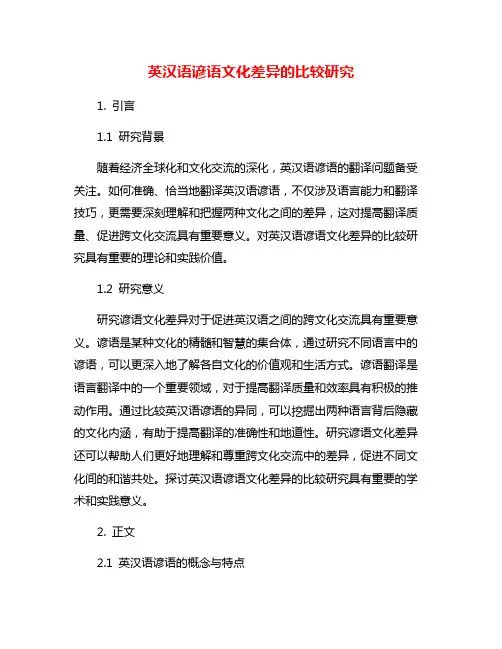
英汉语谚语文化差异的比较研究1. 引言1.1 研究背景随着经济全球化和文化交流的深化,英汉语谚语的翻译问题备受关注。
如何准确、恰当地翻译英汉语谚语,不仅涉及语言能力和翻译技巧,更需要深刻理解和把握两种文化之间的差异,这对提高翻译质量、促进跨文化交流具有重要意义。
对英汉语谚语文化差异的比较研究具有重要的理论和实践价值。
1.2 研究意义研究谚语文化差异对于促进英汉语之间的跨文化交流具有重要意义。
谚语是某种文化的精髓和智慧的集合体,通过研究不同语言中的谚语,可以更深入地了解各自文化的价值观和生活方式。
谚语翻译是语言翻译中的一个重要领域,对于提高翻译质量和效率具有积极的推动作用。
通过比较英汉语谚语的异同,可以挖掘出两种语言背后隐藏的文化内涵,有助于提高翻译的准确性和地道性。
研究谚语文化差异还可以帮助人们更好地理解和尊重跨文化交流中的差异,促进不同文化间的和谐共处。
探讨英汉语谚语文化差异的比较研究具有重要的学术和实践意义。
2. 正文2.1 英汉语谚语的概念与特点英汉语谚语是一种常见的语言表达方式,在英语和汉语中都有着丰富的谚语资源。
谚语是人们在长期生活实践中总结出来的具有智慧和哲理的短小句子,具有较高的文化内涵和智慧。
英汉语谚语在表达形式、文化内涵和使用场景等方面存在一些共同点和区别。
英汉语谚语都是用简练的语言形式表达深刻的哲理和经验。
它们在几个词汇中蕴含着丰富的含义,能够直观地传达人们的思想和观念。
英语谚语"Actions speak louder than words"传达了实际行动比空谈更有力量的道理;而汉语谚语"知己知彼,百战百胜"则强调了了解对手和自己才能取得胜利。
英汉语谚语在文化内涵方面存在一定的差异。
英语谚语多以自然、动物、日常生活等为载体,强调实用性和生活智慧;而汉语谚语则更注重历史、文化、宗教等方面,反映了中国传统文化的思想和价值观。
英语谚语"A rolling stone gathers no moss"比喻不安定的生活方式不利于积累财富和成就;而汉语谚语"塞翁失马,焉知非福"则讲述了一个塞翁因失马而获福的故事,强调了看问题要有全面的思考。
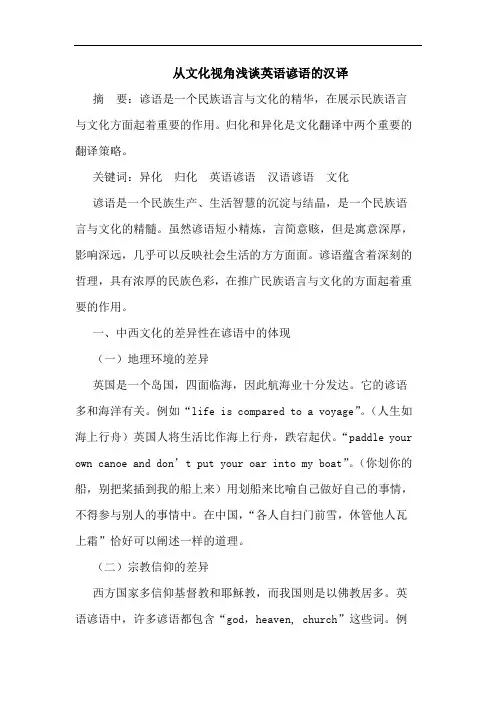
从文化视角浅谈英语谚语的汉译摘要:谚语是一个民族语言与文化的精华,在展示民族语言与文化方面起着重要的作用。
归化和异化是文化翻译中两个重要的翻译策略。
关键词:异化归化英语谚语汉语谚语文化谚语是一个民族生产、生活智慧的沉淀与结晶,是一个民族语言与文化的精髓。
虽然谚语短小精炼,言简意赅,但是寓意深厚,影响深远,几乎可以反映社会生活的方方面面。
谚语蕴含着深刻的哲理,具有浓厚的民族色彩,在推广民族语言与文化的方面起着重要的作用。
一、中西文化的差异性在谚语中的体现(一)地理环境的差异英国是一个岛国,四面临海,因此航海业十分发达。
它的谚语多和海洋有关。
例如“life is compared to a voyage”。
(人生如海上行舟)英国人将生活比作海上行舟,跌宕起伏。
“paddle your own canoe and don’t put your oar into my boat”。
(你划你的船,别把桨插到我的船上来)用划船来比喻自己做好自己的事情,不得参与别人的事情中。
在中国,“各人自扫门前雪,休管他人瓦上霜”恰好可以阐述一样的道理。
(二)宗教信仰的差异西方国家多信仰基督教和耶稣教,而我国则是以佛教居多。
英语谚语中,许多谚语都包含“god,heaven, church”这些词。
例如“all are not saints that go to church”。
(上教堂的不都是圣徒)“you can not serve god and mammon”。
(不能又敬上帝又敬财神)在我国的与宗教有关的谚语中,多以佛教,道教为主。
例如“道高一尺魔高一丈”“平时不努力,临时抱佛脚”。
(三)风俗习惯的差异谈到风俗习惯,最明显的一点就是在对待”狗”这个问题上。
我国的谚语及一些口头语中,当人们谈到狗的时候,多是带有一些厌恶,蔑视的感情色彩。
例如“好狗不拦路”“狼到千里吃人,狗到天边吃屎”来比喻人的本性任何时候都不会改变。
而在英国,有关狗的一些谚语则是充满了对狗的喜爱、夸赞之情。
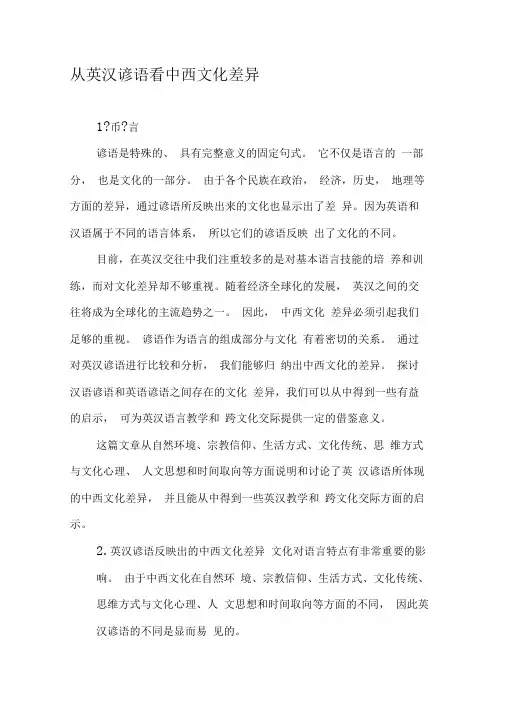
从英汉谚语看中西文化差异1?币?言谚语是特殊的、具有完整意义的固定句式。
它不仅是语言的一部分,也是文化的一部分。
由于各个民族在政治,经济,历史,地理等方面的差异,通过谚语所反映出来的文化也显示出了差异。
因为英语和汉语属于不同的语言体系,所以它们的谚语反映出了文化的不同。
目前,在英汉交往中我们注重较多的是对基本语言技能的培养和训练,而对文化差异却不够重视。
随着经济全球化的发展,英汉之间的交往将成为全球化的主流趋势之一。
因此,中西文化差异必须引起我们足够的重视。
谚语作为语言的组成部分与文化有着密切的关系。
通过对英汉谚语进行比较和分析,我们能够归纳出中西文化的差异。
探讨汉语谚语和英语谚语之间存在的文化差异,我们可以从中得到一些有益的启示,可为英汉语言教学和跨文化交际提供一定的借鉴意义。
这篇文章从自然环境、宗教信仰、生活方式、文化传统、思维方式与文化心理、人文思想和时间取向等方面说明和讨论了英汉谚语所体现的中西文化差异,并且能从中得到一些英汉教学和跨文化交际方面的启示。
2.英汉谚语反映出的中西文化差异文化对语言特点有非常重要的影响。
由于中西文化在自然环境、宗教信仰、生活方式、文化传统、思维方式与文化心理、人文思想和时间取向等方面的不同,因此英汉谚语的不同是显而易见的。
2.1自然环境有些谚语与当地的地理环境和自然风景有紧密的联系,因此英汉谚语在这一方面有很多不同之处。
例如,中国有很多的山河,于是有了以下的谚语:有眼不识泰山。
长江后浪推前浪,一代新人换旧人。
但是,西方的许多国家都临近海洋,人们的生活与海洋息息相关。
例如:It is hard sailing where there is no wind. 无风难使帆。
A smooth sea never made a skillful mariner. 平静的大海练不出好水手。
上面的谚语反映了不同国家的不同自然环境,一个国家的文化背景与其自然环境有着密切的联系。
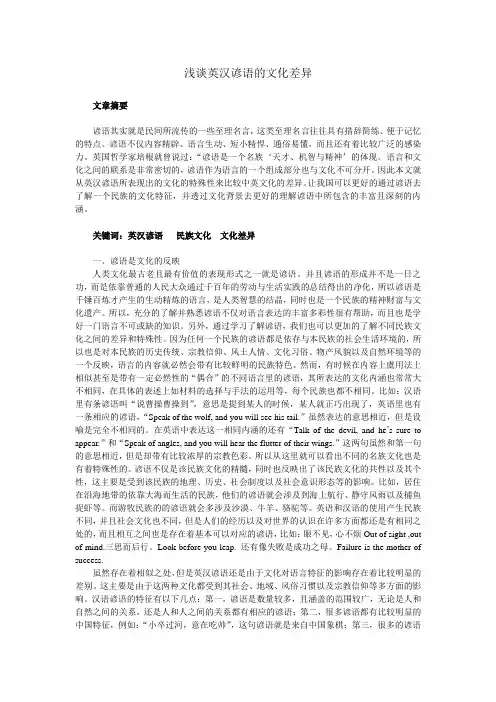
浅谈英汉谚语的文化差异文章摘要谚语其实就是民间所流传的一些至理名言,这类至理名言往往具有措辞简练、便于记忆的特点。
谚语不仅内容精辟、语言生动、短小精悍、通俗易懂,而且还有着比较广泛的感染力。
英国哲学家培根就曾说过:“谚语是一个名族‘天才、机智与精神’的体现。
语言和文化之间的联系是非常密切的,谚语作为语言的一个组成部分也与文化不可分开。
因此本文就从英汉谚语所表现出的文化的特殊性来比较中英文化的差异。
让我国可以更好的通过谚语去了解一个民族的文化特征,并透过文化背景去更好的理解谚语中所包含的丰富且深刻的内涵。
关键词:英汉谚语民族文化文化差异一、谚语是文化的反映人类文化最古老且最有价值的表现形式之一就是谚语。
并且谚语的形成并不是一日之功,而是依靠普通的人民大众通过千百年的劳动与生活实践的总结得出的净化,所以谚语是千锤百炼才产生的生动精炼的语言,是人类智慧的结晶,同时也是一个民族的精神财富与文化遗产。
所以,充分的了解并熟悉谚语不仅对语言表达的丰富多彩性很有帮助,而且也是学好一门语言不可或缺的知识。
另外,通过学习了解谚语,我们也可以更加的了解不同民族文化之间的差异和特殊性。
因为任何一个民族的谚语都是依存与本民族的社会生活环境的,所以也是对本民族的历史传统、宗教信仰、风土人情、文化习俗、物产风貌以及自然环境等的一个反映,语言的内容就必然会带有比较鲜明的民族特色。
然而,有时候在内容上虞用法上相似甚至是带有一定必然性的“偶合”的不同语言里的谚语,其所表达的文化内涵也常常大不相同,在具体的表述上如材料的选择与手法的运用等,每个民族也都不相同。
比如:汉语里有条谚语叫“说曹操曹操到”,意思是提到某人的时候,某人就正巧出现了,英语里也有一条相应的谚语,“Speak of the wolf, and you will see his tail.”虽然表达的意思相近,但是设喻是完全不相同的。
在英语中表达这一相同内涵的还有“Talk of the devil, and he’s sure to appear.”和“Speak of angles, and you will hear the flutter of their wings.”这两句虽然和第一句的意思相近,但是却带有比较浓厚的宗教色彩。
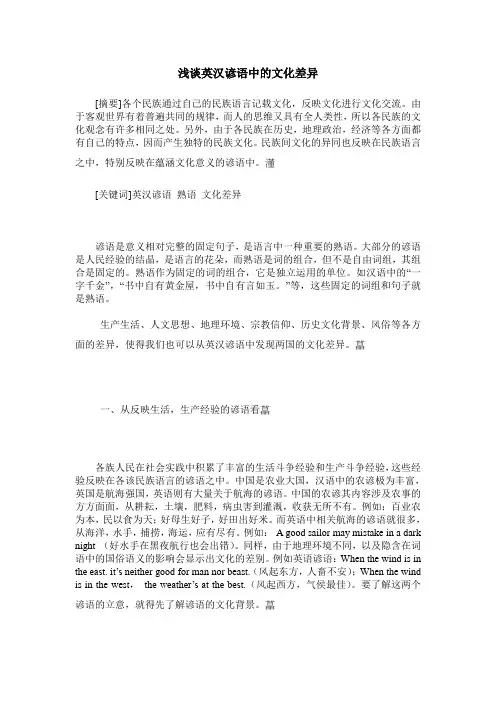
浅谈英汉谚语中的文化差异[摘要]各个民族通过自己的民族语言记载文化,反映文化进行文化交流。
由于客观世界有着普遍共同的规律,而人的思维又具有全人类性,所以各民族的文化观念有许多相同之处。
另外,由于各民族在历史,地理政治,经济等各方面都有自己的特点,因而产生独特的民族文化。
民族间文化的异同也反映在民族语言之中,特别反映在蕴涵文化意义的谚语中。
[关键词]英汉谚语熟语文化差异谚语是意义相对完整的固定句子,是语言中一种重要的熟语。
大部分的谚语是人民经验的结晶,是语言的花朵,而熟语是词的组合,但不是自由词组,其组合是固定的。
熟语作为固定的词的组合,它是独立运用的单位。
如汉语中的“一字千金”,“书中自有黄金屋,书中自有言如玉。
”等,这些固定的词组和句子就是熟语。
生产生活、人文思想、地理环境、宗教信仰、历史文化背景、风俗等各方面的差异,使得我们也可以从英汉谚语中发现两国的文化差异。
一、从反映生活,生产经验的谚语看各族人民在社会实践中积累了丰富的生活斗争经验和生产斗争经验,这些经验反映在各该民族语言的谚语之中。
中国是农业大国,汉语中的农谚极为丰富,英国是航海强国,英语则有大量关于航海的谚语。
中国的农谚其内容涉及农事的方方面面,从耕耘,土壤,肥料,病虫害到灌溉,收获无所不有。
例如:百业农为本,民以食为天;好母生好子,好田出好米。
而英语中相关航海的谚语就很多,从海洋,水手,捕捞,海运,应有尽有。
例如:A good sailor may mistake in a dark night (好水手在黑夜航行也会出错)。
同样,由于地理环境不同,以及隐含在词语中的国俗语义的影响会显示出文化的差别。
例如英语谚语:When the wind is in the east. it’s neithe r good for man nor beast.(风起东方,人畜不安);When the wind is in the west,the weather’s at the best.(风起西方,气侯最佳)。
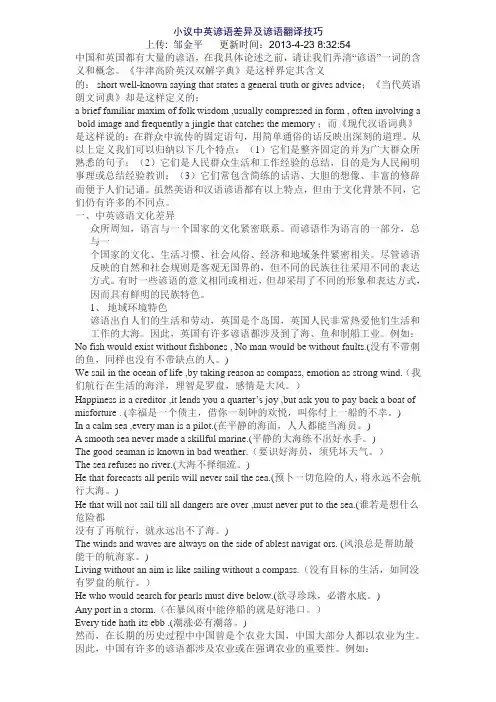
小议中英谚语差异及谚语翻译技巧上传: 邹金平更新时间:2013-4-23 8:32:54中国和英国都有大量的谚语,在我具体论述之前,请让我们弄清“谚语”一词的含义和概念。
《牛津高阶英汉双解字典》是这样界定其含义的: short well-known saying that states a general truth or gives advice;《当代英语朗文词典》却是这样定义的:a brief familiar maxim of folk wisdom ,usually compressed in form , often involving a bold image and frequently a jingle that catches the memory ;而《现代汉语词典》是这样说的:在群众中流传的固定语句,用简单通俗的话反映出深刻的道理。
从以上定义我们可以归纳以下几个特点:(1)它们是整齐固定的并为广大群众所熟悉的句子;(2)它们是人民群众生活和工作经验的总结,目的是为人民阐明事理或总结经验教训;(3)它们常包含简练的话语、大胆的想像、丰富的修辞而便于人们记诵。
虽然英语和汉语谚语都有以上特点,但由于文化背景不同,它们仍有许多的不同点。
一、中英谚语文化差异众所周知,语言与一个国家的文化紧密联系。
而谚语作为语言的一部分,总与一个国家的文化、生活习惯、社会风俗、经济和地域条件紧密相关。
尽管谚语反映的自然和社会规则是客观无国界的,但不同的民族往往采用不同的表达方式。
有时一些谚语的意义相同或相近,但却采用了不同的形象和表达方式,因而具有鲜明的民族特色。
1、地域环境特色谚语出自人们的生活和劳动,英国是个岛国,英国人民非常热爱他们生活和工作的大海。
因此,英国有许多谚语都涉及到了海、鱼和制船工业。
例如:No fish would exist without fishbones , No man would be without faults.(没有不带刺的鱼,同样也没有不带缺点的人。


浅谈中西方谚语的文化差异学生:罗玲指导老师:谷一明摘要:谚语是语言文化的瑰宝,它以其深刻、简练的语言浓缩了各民族的历史文化,反映了劳动人民的生活实践经验。
透过谚语的窗口来窥探中西方文化中的风俗习惯、宗教文化及思维方式的差异,令人更深刻的感悟到谚语传递的文化蕴含。
本文着重从谚语折射出的对生存环境、风俗习惯、宗教信仰和道德观念四方面来探讨中西方文化的差异。
通过对中西方谚语的对比研究折射出的文化差异,展现了中西方文化差异带来的异域风情!关键词:谚语;中西方;文化差异;Cultural Differences between English and Chinese ProverbsAbstract: Proverbs are a treasure of language culture, with its profound and concise language condensing history and culture of various nationalities. Most reflect the practical experience of working people's life. Through the proverbial window to spy the differences of Western and Chinese social customs and habits religion, and way of thinking, people come to perceive more profound cultural implication passed on by proverbs. This article focuses on the living environment, customs, religious beliefs and moral conception reflected by the proverbs, in these four aspects to explore differences between Western Chinese culture.Through the comparative study of Chinese and Western proverbs, this demonstrates the exotic differences between Chinese and Western culture.Key words: proverbs;west and east; cultural differences;ContentsIntroductionPart I The definition,classifications and features of proverbs1.1The definition of proverbs1.2The classifications of proverbs1.3The features of proverbs1.3.1The particular syntactic structurePart II The functions of proverbs2.1 The phatic communication2.2 Cultivation of mind and formation of behavior2.3 Perception of the nature2.3.1 Experience of observing weather2.3.2 Awareness of creature’s survival and reproduction2.4 Summarizing the experience of life2.4.1 appropriate way of interpersonal relationship2.4.2 experience obtained from workPart III Cultural Difference between Western and Chinese proverbs3.1 Different way of life3.1.1 The majority of English proverbs concerning sailing,fishing3.1.2 Chinese proverb associated more with agricultural production3.1.3 Geography determines the way of life3.2 Proverbs demonstrate the different customs3.2.1 Different culture of pets3.2.2 The valuation of etiquette3.2.1.4 Chinese value friendship3.2.1.5 Westerners are self-centered3.3 Proverbs reflects the differences of religious belief3.3.1 Most westerners believe in Christian3.3.1.1 God is the supreme god3.3.1.2 Advocation of equality3.3.2 Chinese largely believe in buddhism,taonism,confucianism3.3.2.1 Atheism,believe in the power of abstraction3.3.2.2 Hierarchical,class-oriented from person to person3.4 Proverbs embodies the differences of the moral conception3.4.1 The different value of the public reputation3.4.3 Ongoing discrimination against chinese women3.4.4 western women are of high statusConclusionBibliography。
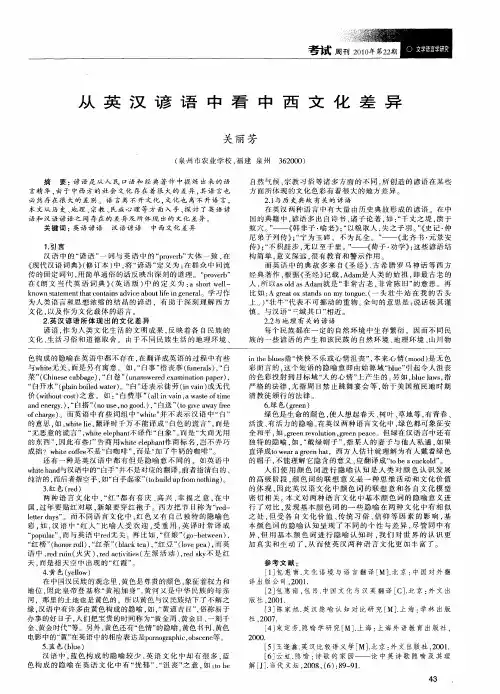
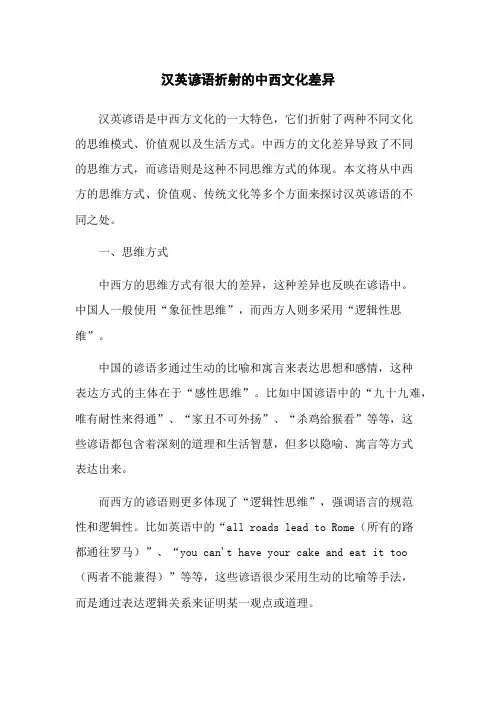
汉英谚语折射的中西文化差异汉英谚语是中西方文化的一大特色,它们折射了两种不同文化的思维模式、价值观以及生活方式。
中西方的文化差异导致了不同的思维方式,而谚语则是这种不同思维方式的体现。
本文将从中西方的思维方式、价值观、传统文化等多个方面来探讨汉英谚语的不同之处。
一、思维方式中西方的思维方式有很大的差异,这种差异也反映在谚语中。
中国人一般使用“象征性思维”,而西方人则多采用“逻辑性思维”。
中国的谚语多通过生动的比喻和寓言来表达思想和感情,这种表达方式的主体在于“感性思维”。
比如中国谚语中的“九十九难,唯有耐性来得通”、“家丑不可外扬”、“杀鸡给猴看”等等,这些谚语都包含着深刻的道理和生活智慧,但多以隐喻、寓言等方式表达出来。
而西方的谚语则更多体现了“逻辑性思维”,强调语言的规范性和逻辑性。
比如英语中的“all roads lead to Rome(所有的路都通往罗马)”、“you can't have your cake and eat it too(两者不能兼得)”等等,这些谚语很少采用生动的比喻等手法,而是通过表达逻辑关系来证明某一观点或道理。
二、价值观不同的文化往往有着不同的价值观。
汉英谚语的不同之处还表现在它们所体现的价值观上。
中国的传统文化强调“仁义礼智信”等价值观,而这些价值观也影响了中国谚语的表达方式。
比如“有志者事竟成”、“宁为玉碎,不为瓦全”、“己所不欲,勿施于人”等等,这些谚语反映了中国传统文化中强调的努力、坚强、自律、为他人着想等价值观。
西方文化则强调个人的自我实现和自我表达,西方谚语中强烈的个人主义色彩也反映了这种价值观。
比如“no pain, no gain(不劳则无获)”、“be yourself(做自己)”等等,这些谚语强调个人的独立性和自我担当的精神。
三、传统文化的影响不同的传统文化对汉英谚语的表达方式产生了巨大的影响。
中国的传统文化重视道德与修养,这种价值观也体现在谚语中。
英汉语谚语文化差异的比较研究英汉语谚语是两种语言中的固定词组或表达方式,经常用于传达特定的文化价值观念和智慧。
通过比较英汉语谚语的文化差异,可以深入了解两种语言和文化的异同之处。
英汉语谚语在文化内涵上存在明显的差异。
中文谚语强调传统价值观念、家庭和社会关系以及道德规范。
中文谚语“一家人,一条心”强调家庭团结、互助和共同目标的重要性。
而英文谚语更注重实用主义、个人主义的价值观念,如“Time is money”强调时间的宝贵和效率。
英汉语谚语在表达方式上也存在差异。
中文谚语更注重形象、比喻和诗意的表达方式。
“积少成多”这个中文谚语通过简洁却意味深长的比喻,表达了积累的重要性。
而英文谚语则更注重简洁明了的表达方式,如“Actions speak louder than words”中通过对比两种行为方式,强调实际行动的重要性。
英汉语谚语在文化传承和教育中的应用也存在差异。
中文谚语在中国社会中被广泛应用于家庭教育、学校教育以及社会交流中,体现了中国文化的深厚底蕴和智慧。
而英文谚语在西方社会中也被广泛使用,但在教育和社会交流中的应用相对较少,更多的体现在文学、电影等艺术形式中。
英汉语谚语在文化因素上的差异也值得关注。
中文谚语更加注重与自然环境、农耕文化和哲学思想的联系,如“物以类聚,人以群分”表达了人们在社会中的分类和归属。
而英文谚语则更注重商业、工业和个人价值观念,如“a bird in hand is worth two in the bush”通过对比鸟在手和鸟在林的拥有价值,强调短期利益的重要性。
英汉语谚语的比较研究能够深入了解两种语言和文化的差异。
通过比较谚语的文化内涵、表达方式、教育应用和文化因素,可以加深我们对两种语言和文化之间的理解和沟通,促进跨文化交流和交流的发展。
从英汉谚语对比看中英文化差异谚语是一个国家人民日常工作经验概括与总结,其内容精辟,寓意深邃,具有广泛的感染力,从中折射出一个国家的地理,历史,社会制度,生活哲理,社会观点和态度及其丰富的文化内涵.作为一种语言,谚语的独特魅力在于它是民族文化的精邃.既反映了一个民族文化的共性又反映了其个性--受该民族的价值观念,宗教信仰,审美习惯,历史文化,社会制度和社会意识形态的影响。
比如,居住在沿海一带,靠海生活的民族,其谚语往往涉及海上航行,经受风雨,捕鱼捉虾。
而游牧民族的谚语则多涉及沙漠,草原,牛羊,骆驼和豺狼。
谚语是民间流传的至理名言,措辞简练,便于记忆。
谚语内容精辟,语言生动,短小精悍,通俗易懂,因而有广泛的感染力。
正如培根所说:“谚语是一个民族天才,机智和精神的体现。
”正如上所说,语言与文化是分不开的。
语言是文化的一部分,但是它又是一种特殊的文化。
语言与文化间的关系,是双向的影响制约的关系。
有些社会学家认为,语言是文化的冠石--没有语言,就没有文化;从另一个方面看,语言又受文化的影响,反映文化。
可以这样说,语言反映一个民族的特征,它不仅包含着该民族的历史和文化背景,而且蕴涵着该民族对人生的看法,生活方式和思维方式。
社会学家告诉我们,一切文化是独特的,互不相同的。
人类学家Sapir在其《语言论》中说:“语言是个底座,说一种语言的人是属于一个种族或几个种族的,也就是说属于身体上具有某些特征而又不同于别的群体的一个群。
语言…….决定我们生活面貌的风格和信仰的总体。
”不同的民族在漫长的历史进程中孕育了独具特色的文化。
总的说来,英美文化的主线是个人主义(或称个人本位),而中国文化(以汉族文化为代表)则以集体主义(或称人伦本位)为主线。
此外,英美文化受宗教的影响比较大,而儒家思想则在中国的文化中留下深深的烙印,漫长的封建社会对中国文化的影响也是显而易见。
下面从几个方面来看英汉谚语的异同一、价值观念价值是人们对什么是可取,什么是不可取的指向性考虑和评价。
英汉谚语的文化差异及翻译谚语在字典中的定义是短小精练的民间智慧警句,一般形式严谨,经常包括鲜明的形象和使人难忘的韵律。
谚语必须非常睿智,而且经得起时间的考验,才能广为流传。
英汉两种语言历史悠久,包含着大量的谚语,由于地理、历史、宗教信仰、生活习俗等方面的差异,英汉谚语承载着不同的民族文化特色和文化信息,它们与文化传统紧密相连,不可分割。
谚语中的文化因素往往是翻译中的难点。
1. 与基督教有关的谚语(Proverbs related to Christianity)宗教是谚语的重要来源之一。
汉语的谚语“平时不烧香,临时抱佛脚”明显与曾在中国广泛流传的佛教有关。
包括英语在内的西方国家的主要宗教是基督教。
许多英语谚语和基督教有着这样那样的关系是十分自然的。
Man proposes, God disposes.谋事在人,成事在天。
God help those who help themselves.自助者天助之。
God sends meat and the devil sends cooks.上帝赐给食物,魔鬼派来厨师。
Each cross hath its own inscription.每个十字架都有自己的铭文。
以上谚语明显与基督教有关,因为谚语里出现的“上帝”或“十字架”都是基督教的象征。
非常有意思的一点是英语中的God经常与汉语中的“天”相对应。
基督教徒崇拜上帝。
英语中God save the Queen是家喻户晓的句子。
当一个说英语的人突然从紧张、焦急、或压力下解脱出来的时候,会脱口而出:Thank God!中国人崇拜“天”。
中国古代的皇帝是“天子”,运气好的人是“天之骄子”。
只要好心人得到报答而恶人受到惩罚,我们就会说“苍天有眼”。
英国人和中国人都要有寻求帮助的对象。
只是说英语的人找的是上帝,而中国人找的是“天”而已。
2. 出自《圣经》和英语文学巨著里的谚语(Proverbs derived from the Bible and great English literary works)《圣经》是最广为阅读的书之一,也是包括英语国家在内的西方世界最有影响力的宗教作品。
英汉语谚语文化差异的比较研究英汉语谚语是两种不同文化的象征和表达方式。
它们反映了国家的传统、价值观和生活方式。
本文将对英汉语谚语文化差异进行比较研究,以探讨两种文化的异同和背后的文化含义。
在文化含义方面,英汉语谚语也呈现出不同的价值观和生活方式。
在英语中,常用的谚语如“Birds of a feather flock together”,“All that glitters is not gold”等等,强调个人的自由和独立。
而在中文中,谚语像“知足常乐”,“羊毛出在羊身上”则强调的是团结和共同体。
在喻意方面,英汉语谚语也有着显著的差异。
英语谚语强调的是现实主义和个体力量,如“Rome was not built in a day” 反映出的是耐心和毅力。
而中文谚语则更多体现出的是儒家文化的智慧,如“和合共生”,“高瞻远瞩”。
两种文化的语言谚语所包含的文化内涵也有所不同。
在英国,动物和自然现象常被用作比喻,如“Don't count your chickens before they are hatched” 而在中国,则大部分谚语都与人物、历史和哲学思想结合,例如“打铁还需自身硬”。
令人感兴趣的是,在英汉语谚语中,也存在一些相似之处。
比如英语中常用的“Actions speak louder than words” 和中文中的“实事求是”,表达了相同的智慧和价值观。
未来的研究方向包括对更多英汉语谚语的比较分析,探讨谚语背后的文化内涵,并深入研究如何有效地跨文化传播和交流。
希望本文能为对英汉语谚语文化差异感兴趣的读者提供一些有益的启示。
英汉谚语的文化差异及翻译一、英汉谚语中所反映的文化差异1起源差异首先,英汉谚语都受到宗教思想的影响,但同中又有异。
英谚受基督教的影响,反映了基督教的伦理道德和行为规范,如:No respecter of persons.(一视同仁);Man propose,God disposes.(谋事在人,成事在天)等,而汉谚则受到“儒”、“释”、“道”三教的影响。
其次,英汉谚语的起源差别还是很大的。
英谚中有大量出自典章及名人的作品中那些脍炙人口的词句,如:Never say die.(永远不要说”死定了”)出自英国小说狄更斯的《匹克威克外传》;而汉语文史学家们则认为汉谚相当一部分出自社会生活和生产实践,如:“远亲不如近邻”是对日常生活经验的总结。
2生存环境的差异谚语的产生与人们的劳动和生活密切相关。
英国是一个岛国,历史上航海业曾一度领先世界;而汉民族在亚洲大陆生活繁衍,人们的生活离不开土地。
3习俗差异汉谚语差异是多方面的,最典型的莫过于在对狗这种动物的态度上。
狗在汉语中是一种卑微的动物。
汉语中与狗有关的谚语大都含有贬意:“狐朋狗党”、“狗急跳墙”、“狼心狗肺”、“狗腿子”等,尽管近些年来养庞物狗的人数大大增加,狗的“地位”似乎有所改变,但狗的贬义形象却深深地留在汉语言文化中。
而在西方英语国家,狗被认为是人类最忠诚的朋友。
英语中有关狗的谚语除了一部分因受其他语言的影响而含有贬义外,大部分都没有贬义。
在英语习语中,常以狗的形象来比喻人的行为。
如:Every dog has his day.(人皆有出头日);Love me, love my dog.(爱屋及乌)等。
learnmewtricks(老人学不了新东西)等等。
形容人“病得厉害”用sickasadog,“累极了”是dog-tired。
与此相反,中国人十分喜爱猫,用“馋猫”比喻人贪嘴,常有亲呢的成份,而在西方文化中,“猫”被用来比喻“包藏祸心的女人”。
4宗教信仰方面与宗教信仰有关的谚语也大量地出在在英汉语言中。
从英汉谚语反映的道德观看中西方文化差异
从英汉谚语反映的道德观看中西方文化差异
语言是文化的载体,汉英谚语都承载着丰富的文化内涵.每一个民族都有自己的道德观念和标准,道德是民族文化的一部分,因此很多英汉谚语反映了中西方不同历史时期的道德观念,通过对比分析英汉谚语中所反映的不同道德观念,可以加深对中西方文化差异的了解,提高正确理解、翻译和使用英语谚语的能力.
作者:胡振东 HU Zhen-dong 作者单位:岳阳职业技术学院,湖南,岳阳,414000 刊名:岳阳职业技术学院学报英文刊名:JOURNAL OF YUEYANG VOCATIONAL TECHNOLOGY COLLEGE 年,卷(期):2006 21(2) 分类号:G0 关键词:谚语道德观念文化差异。